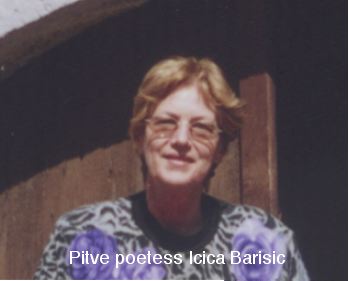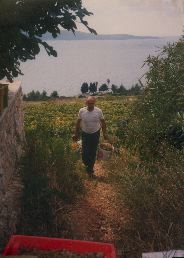Croatian is a difficult language for foreigners to learn, all the more so because each region of Croatia uses local variations on the “standard” language.
Hvar Island village dialects
On Hvar Island every village has its own dialect. Local people know immediately which place other islanders come from, and who is not an islander, as soon as the first words are spoken. Some of the dialects are more or less understandable to those who know Italian, while others can come close to being impenetrable to outsiders, especially foreigners who have learned “standard” Croatian. The dialect of Jelsa falls into the former category, possibly because it is a sea port, whereas the dialect of Pitve, an inland village, belongs to the latter.
The village dialects have survived to the present time, but now fewer and fewer families use them for everyday communication. The village populations are small, so young people are increasingly marrying people from outside their locality, whether from other parts of the island, other islands, the Croatian mainland, or other countries. There used to be several village schools on Hvar, but most are now closed. Pitve, for instance, had its own school until about 40 years ago, but now children from the area go to school in Jelsa, and later on may go to Split or Zagreb for their further education. Children are exposed to foreign languages from an early age at school, as well as through the internet, television, and the many foreign visitors who come to the island each year for their holidays.

There is therefore little incentive or even opportunity to speak a local language known only to a dwindling few, although many children still understand the dialect of their forefathers through hearing older people speak it. A local dialect is an important part of a person’s cultural background. The loss of ancient local dialects and languages is happening all over the world. In some cases it has happened more rapidly through forceful suppression of particular groups, such as Native American or Australian indigenous tribes, while in others it simply reflects increasing globalization.
Preserving old languages
We cannot keep the old dialects and languages alive artificially, but with modern technology we can preserve the knowledge of how they were through recordings of people who still use them. On Hvar Island this invaluable task has been taken on by dialect speakers from different parts of the island who express their language and culture in poetry. The representative for Pitve is Ičica Barišić, who has written, published and recorded collections of poems reflecting the life, customs and history of her native village.
Pitve is a very small village. Divided into two parts, its upper older section, Gornje (Stare) Pitve, numbers about 40 permanent residents. The lower part, Donje Pitve, has about 80-100, but the number fluctuates, being greatly inflated during the summer, and depleted during the winter. Many Pitvans have emigrated to nearby Jelsa, the closest town, although they mostly return faithfully to their home church for Sunday mass, religious festivals, weddings and funerals.
Easter procession tradition
One of the oldest traditions in the locality is the
Maundy Thursday Procession, in which chosen Cross-bearers set off from each of six villages near Jelsa to walk overnight in a circuit between the villages, chanting and praying all the way until they get back to their home church the following morning. The tradition dates back about 600 years. The Cross-bearer has an entourage of his choice, and is usually followed by a group composed of pious parishioners and some from elsewhere. Local children may join in the procession from as young as seven. IčIca Barišić has captured the atmosphere of the occasion in her poem “
Za križen ” (“Following the Cross”).
Organic farming tradition

Farming is an integral part of life in the village, focussing mainly on olives and grapes. As elsewhere, some farmers use pesticides and artificial fertilizers, whereas others keep to the natural farming methods which are now usually referred to as organic (ekološki in Croatian). The poem “
Sa suncen ustane ” (“He gets up at sunrise”) celebrates the determination of a young farmer from Pitve, Ivo Mileta, to follow in the footsteps of his forebears and re-establish vineyards and olive groves according to sound environmental principles. He inherited vineyards from his grandfather which had been untouched for decades, therefore unpolluted by chemicals, and re-introduced old grape varieties alongside the more commonly grown types, to produce high-quality wine. His equally organic olive groves on the island of Ščedro produce some of the finest olive oil imaginable. Earth is the basis of our life, and we have to find harmony with it. “
Iz zemje je rič iznikla ” (“The Word came forth from the earth”) is a poem celebrating the satisfaction reaped from cultivating uncontaminated land surrounded by clean sea. It represents the harmony between humans and their environment.
The sea
As Hvar is a long thin island, the sea is visible from most parts of it. The sea reflects the mood of the weather and the environment. Ičica Barišić was asked one day by her young grandson Toma why the sea was angry. It was his first experience of the sea in stormy mood, contrasting with the usual flat calm of the Adriatic. She turned his question into a poem, “
Ča se more naidilo ?”, creating a word-picture of the turbulence of the water to give Toma a memento of the dialect of his forefathers that he would probably never speak, given that he lives in Zagreb, far away from these roots.
Statue of Janus
Gornje Pitve is reputedly the oldest continually inhabited settlement on Hvar Island, dating back to Illyrian times. In the church courtyard in Pitve a statue of the double-faced Roman god Janus guards the wall looking down over the sea. It was said to be a Roman relic, but in fact is more likely to date from much later on. The statue's origins will probably never be known. The poem “
Janus ” depicts the strangeness of this “guardian of the gateways” turning up in Pitve without any evidence of his provenance. The past is often a mystery, which we can enjoy and from which we can learn.

© Vivian Grisogono 2010. Updated 2014

 Farming is an integral part of life in the village, focussing mainly on olives and grapes. As elsewhere, some farmers use pesticides and artificial fertilizers, whereas others keep to the natural farming methods which are now usually referred to as organic (ekološki in Croatian). The poem “Sa suncen ustane ” (“He gets up at sunrise”) celebrates the determination of a young farmer from Pitve, Ivo Mileta, to follow in the footsteps of his forebears and re-establish vineyards and olive groves according to sound environmental principles. He inherited vineyards from his grandfather which had been untouched for decades, therefore unpolluted by chemicals, and re-introduced old grape varieties alongside the more commonly grown types, to produce high-quality wine. His equally organic olive groves on the island of Ščedro produce some of the finest olive oil imaginable. Earth is the basis of our life, and we have to find harmony with it. “Iz zemje je rič iznikla ” (“The Word came forth from the earth”) is a poem celebrating the satisfaction reaped from cultivating uncontaminated land surrounded by clean sea. It represents the harmony between humans and their environment.
Farming is an integral part of life in the village, focussing mainly on olives and grapes. As elsewhere, some farmers use pesticides and artificial fertilizers, whereas others keep to the natural farming methods which are now usually referred to as organic (ekološki in Croatian). The poem “Sa suncen ustane ” (“He gets up at sunrise”) celebrates the determination of a young farmer from Pitve, Ivo Mileta, to follow in the footsteps of his forebears and re-establish vineyards and olive groves according to sound environmental principles. He inherited vineyards from his grandfather which had been untouched for decades, therefore unpolluted by chemicals, and re-introduced old grape varieties alongside the more commonly grown types, to produce high-quality wine. His equally organic olive groves on the island of Ščedro produce some of the finest olive oil imaginable. Earth is the basis of our life, and we have to find harmony with it. “Iz zemje je rič iznikla ” (“The Word came forth from the earth”) is a poem celebrating the satisfaction reaped from cultivating uncontaminated land surrounded by clean sea. It represents the harmony between humans and their environment.


